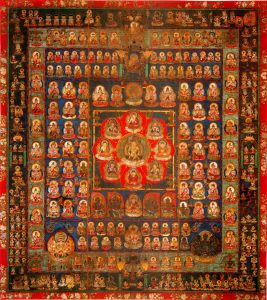Adopting Archetypes: How Ancient Wisdom Helps Us Process Bad Shit
Earlier this week, a brilliant cardiac surgeon was gunned down at a hospital in Boston where he worked tirelessly to save the lives of patients who needed his skills. Such a good person thoughtlessly murdered can make anyone question the sanctity of life, the role of faith & religion, and whether there’s any point to any of this at all. Some people descend into deep depression when these things happen. Others put up hard shells that they think will protect them. Still others resort to anger and call for new laws and legislation.
At the end of the day, however, we still have to find the means to process these bad things. It’s not realistic to shut ourselves away on some mountaintop retreat where we can ensure we are never subjected to such heinous crimes. We have to deal with it. All of it.
But how? How do you reconcile these actions within your own consciousness and somehow find a way to carry on that doesn’t leave you cynical, jaded, grumpy, and depressed? Is there even a way to do it? Or are we simply screwed and beholden to the bad and evil things that happen to us?
There’s no easy answer, of course. And any solution takes time and patience to implement within ourselves. Given that we live in a society that craves immediate gratification, this process can be more painful for some than others. But there are ways to deal with bad shit. And hopefully, this post will provide some ideas for you to explore.
Compartmentalization is one of the ways people who are constantly faced with bad shit deal with it – combat veterans, police officers, first responders, nurses, firefighters, and others like them. They isolate the bad within a small section of their mind and tuck it away, hopefully where they don’t have to deal with it except in the middle of the night. This process has its merits, but if you never confront the bad, then it simply grows even larger within your mind until it becomes far worse than what it was originally.
What if there was another way to potentially deal with bad shit? What if you didn’t have to tuck it away or descend into abject grief every time something bad happens? What if you could pick a new way to respond – not just to bad stuff, per se – but to pretty much any situation?
In esoteric Buddhism, there is a process of modeling that aspiring seekers of enlightenment go through. Without getting all crazy New Agey, there are representative heroic icons within a mandala tapestry. Each icon represents some type of heroic ideal, they come with their own backstory and predominant quality. Blindfolded initiates are asked to throw a flower or some other object onto the mandala and which deity it lands upon is then deemed the one that the student should model themselves on for a period of time. It’s not uncommon for students to model several deities as they seek to comprehend the full extent of ideals and embodiments that are expressed within the mandala.
We can use this process to help us process bad shit. But it does involve some thought. We are, in effect, hacking esoteric Buddhism to suit our own 21st century needs.
The first step is to identify your own personal heroic ideals. Who do you look up to? Who do you aspire to be like in some way, shape, or form? Who inspires you? Draw up a list and try to make it as varied as possible. In other words, don’t just list a whole bunch of strong, silent types. Pick one that best represents that ideal. Then pick someone else who best represents another ideal, like compassion. Or comedic skill. Or someone adept at being diplomatic. Who is always humble but inspiring? Who would you run to for help? Who would know how to make you feel better when you feel lonely and vulnerable?
Your ideals can be real people or fictional characters. The important thing is that their “heroic” qualities are prominent within your own mind. Don’t worry if anyone else agrees with you. My own ideal of a strong warrior protector will no doubt be different from yours, and that is how it should be. This is a personal journey, not a public one.
Once you have your list of heroes, it’s time for some role playing. Like the Buddhist initiate, you’ll now choose an identity to model yourself on. In other words, those qualities that a particular hero embodies, you will now try to make your own.
“Wait – what???”
I know, but bear with me. Look at your list of heroes for a moment. Let’s pick the person or character you chose to be the perfect embodiment of a strong protector – someone you would feel safe with if something awful happened. What is it about that person that makes them your choice? What qualities do they have that make them the ideal in this category? Are they strong? Do they possess skill in combat? Have they been in situations where they prevailed and as a result you feel confident in their skills?
Take your time and really figure out why you chose them to be your hero. Ordinarily, the qualities they possess might be lacking or completely absent within ourselves. Conversely, as we explore the qualities we admire in our heroes, we may discover that we possess some of those same qualities, but they’ve been dormant within us. That’s what makes this process so enriching. We learn about our own weaknesses, vulnerabilities, strengths, and virtues and are then able to take steps to enhance or acquire these same qualities.
How you acquire the abilities embodied within these heroes is really up to you. For some people, modeling themselves can take a very immersive quality. They will literally go out and do the very things that their heroic ideal does or has trained to do. Dustin Hoffman preferred to immerse himself utterly in the role he was playing earlier on in his career. He would become the very character he was playing. This is very similar to that.
Perhaps you would prefer to be a bit more thoughtful in your approach. That’s fine, too. If you are good at imagining yourself as the heroic ideal in your response to certain situations where those qualities would be needed, then that might be the best way to model yourself and acquire those qualities.
Within your list of heroes, pick the one that you chose for their ability to handle awful or devastating grief. What qualities do they possess that make them ideally suited for this? Are they compassionate and empathic? Do they use subtle humor to bring smiles where only tears have flowed? Are they able to see beyond the immediate flood of grief and remember the good that survives in all things, regardless of momentary evil? Do they trust that those left behind in the wake of tragedy will find the strength to carry on and somehow be able to find joy in the memories of those departed souls?
And can you model your own response to grief so that you are more like your hero and less like how you have been in the past?
The point of this journey is to not simply rely upon your own preconceptions and responses to deal with things in life. As we’ve grown, we’ve all developed our own personality and character. We know what we like, what we don’t like, what drives us, what annoys us, and so on. But often, who we are is not enough to process everything that happens in life. So we need to find heroes who can help us develop the qualities we do need to better handle situations. By highlighting those traits we admire in our heroes, we can find those same qualities within ourselves. This then leads to us becoming a more well-rounded individual, capable of dealing with whatever life brings our way.
When I’m faced with grief – for example, when I hear stories of tragedy in the news or find out a close friend has passed on – I can look to my own personal “hero list” for guidance.
How would this hero handle finding out that a loved one had died? How would they process the inevitable grief? How would they resolve to honor the memory of that person and somehow find the strength to carry on living without allowing the bad to overwhelm them?
And how can I mirror those qualities within myself so I am better able to process this bad shit? Do I already possess those qualities and simply need to beef ’em up or do I need to adopt them as my own because I simply do not have them within myself?
Like I said, it’s not necessarily easy work. But there are ways of processing the bad so we don’t end up forgetting about the joys of life that exist in spite of the evil. Eventually, if you choose to undertake this process, you will develop new perspectives that grant you the ability to objectively view reality and decide which heroic ideal you will choose to deal with events and the flow of daily life. These heroic ideals aren’t just for handling the bad stuff; they can be used for pretty much anything. If you’re terrified of speaking in public, who do you know that owns the room when they get up and present? What do they do? What skills do they possess that you do not? And how do you acquire them? How would Stan the Man crush this presentation? Imagine yourself as Stan and embody what he embodies.
Conversely, how would, say, Mother Theresa handle the senseless murder of a good person? How would she grieve? How would she honor the dead and then find the strength to carry on?
Think of this exercise as borrowing from others as a means of enhancing yourself. It’s a journey of self-discovery whereby you honestly assess yourself and your vulnerabilities and strengths. Through modeling, you lessen weaknesses and enhance strengths, becoming ever stronger in the process. The process is an ongoing one, moving from heroic ideal to heroic ideal highlighting those traits they embody and looking for your own through self-exploration. It requires honesty on your part to get the most out of it. But the lessons are priceless. Especially in a world where the ability to view things from another perspective is all too often sorely lacking.




